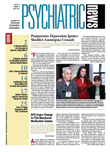A few months ago a passenger flying from San Diego to Washington, D.C., appeared to have a panic attack about flying. Fortunately for her, a psychiatrist was also on the plane and cared for her until the plane landed.
Not all passengers with a fear of flying are lucky enough to have a psychiatrist available during a flight. So what should they do instead? Continue to fly, and when they do, talk back to their negative thoughts.
This advice stems from a study conducted by Page Anderson, Ph.D., an assistant professor of psychology at Georgia State University, and colleagues. Results are in press with the Journal of Anxiety Disorders.
The study, which was launched in 2002, included 88 subjects with a fear of flying; 55 had received cognitive-behavioral therapy (CBT) to treat their fear of flying and were reassessed an average of 2.3 years after treatment, and the remaining 33 had not. The latter served as a comparison group and did not differ from the treatment group in age, education, marital status, race, or income.
All subjects were assessed to determine which skills they used to cope with their apprehension about flying. The subjects who had received CBT were significantly more likely to use two skills they had learned in therapy—taking relaxing breaths and talking back to negative thoughts—than were the subjects who had not received CBT.
However, both groups used a third CBT technique—continuing to fly—at about the same rates. The same held for the deployment of some techniques not taught in CBT, such as the gathering of information about increased airport security measures, seeking reassurance from family or friends about flying, and trying to distract oneself while flying.
The 55 subjects who had received CBT training were then evaluated for their current anxiety about flying and whether there was a link between their flying-apprehension scores and the tactics they used to quell their fear.
And such a link did appear. Talking back to negative thoughts—for example, reminding oneself that “feeling anxious does not mean that you're in danger”—and continuing to fly were significantly linked with lower levels of anxiety.
In contrast, those techniques not taught in CBT and listed above were not significantly linked with lower levels of flying anxiety, nor was the CBT tactic of taking relaxing breaths. “I was surprised that breathing relaxation, perhaps the most popular anxiety-management skill, was not related to reduced flying anxiety,” Anderson told Psychiatric News.
Anderson and her colleagues don't have an explanation for why taking relaxing breaths did not significantly lower the fear of flying. However, they pointed out that this finding is congruent with other recent studies that questioned the technique's value in countering anxiety disorders. In other words, breathing relaxation may constitute a temporary refuge from fears, but does not lead to their extinction. Nonetheless, in this study, taking relaxing breaths was not significantly associated with more flying anxiety, so at least the technique does not seem to aggravate it.
The study results have implications for persons afraid of flying, Anderson said. “They suggest that short-term CBT for fear of flying is effective, even over the long term, and even after a stressful fear-related event. The most important thing fearful flyers can do to overcome their fear is to face it in a therapeutic manner.”
“This study is important because it has collected empirical data on whether patients use what they learn in CBT treatment for fear of flying and whether the use of these skills is associated with better long-term outcome,” H. Blair Simpson, M.D., Ph.D., told Psychiatric News. Simpson is an associate professor of clinical psychiatry at Columbia University and is researching the use of CBT for treating anxiety disorders.
“As noted by the authors,” Simpson continued, “several important limitations in the methodology [such as data collection by self-report] limit broad conclusions. However, the data are consistent with the idea that the positive effects of CBT can persist after acute treatment, but only if patients learn and apply the key skills learned in treatment.”
The study was financed by the National Institute of Mental Health and an unrestricted educational grant from Pfizer Pharmaceuticals.
An abstract of “Use of Skills Learned in CBT for Fear of Flying: Managing Flying Anxiety After September 11” can be accessed at<www.sciencedirect.com> by clicking “J” under “Browse by Title,” then“ Journal of Anxiety Disorders Articles in Press.”▪
